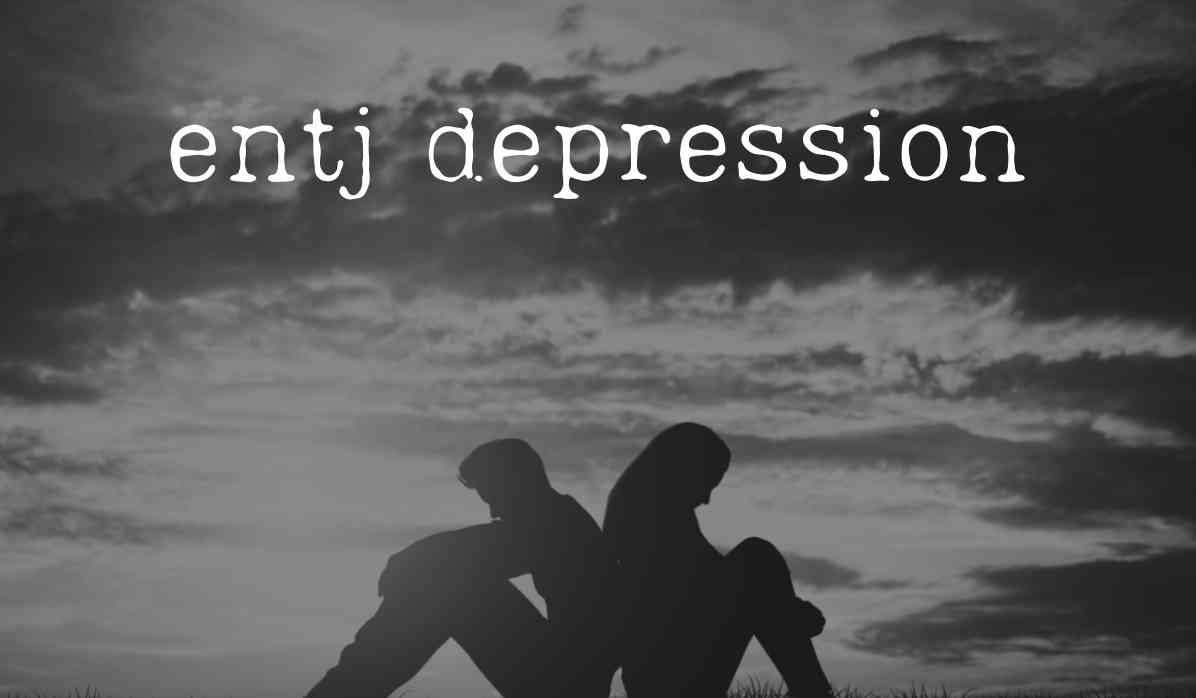How Do ENTJs Deal With Depression? (And How To Help Them)

ENTJs like to be helpful and productive at all times, so being depressed can really affect their ability to stay active and feel worthy.
So how do ENTJs deal with depression?
For ENTJs, it can be pretty hard to accept when they feel depressed and sad since they want to always display a strong, confident persona.
They want others to count on them, so showing vulnerability is scary.
However, when they can’t find answers to their feelings, they’ll put them aside until they can’t be ignored any longer. That tension can build up and become unbearable at some point, so be careful.
They are high-functioning individuals who put a lot of pressure on themselves to get things done and achieve their goals.
So you can imagine how depression can have a snowball effect in that regard.
With less energy, they produce less, making them feel more depressed, giving them less and less energy…
ENTJs are action-oriented and extroverted thinkers. They might not suffer too much from getting inside of their own heads and overthinking.
But they can find it hard to emotionally connect with their actions and decisions, making them feel a little bit lost as a result.
What Makes An ENTJ Feel Depressed?
1. Fading into the background
ENTJs love to stand out and showcase their leadership skills. When they can’t do that, it’s a real bummer for them.
2. Stifling bureaucracy and hierarchy
Bureaucracy is like a kryptonite for ENTJs.
They crave independence and self-sufficiency, so being bogged down by red tape or confined to a strict hierarchy can really get them down.
3. Micromanagement and lack of autonomy
ENTJs thrive when they have the freedom to make their own decisions. When they’re being micromanaged, it’s a huge mood killer.
4. Stagnation and lack of progress
Nothing upsets an ENTJ like feeling stuck or not making the progress they expect. They set high goals and love being ahead of the curve.
5. Absence of challenges and goals
ENTJs need something to work towards, and a life without goals or challenges can lead to depression.
RELATED: Most Independent MBTI Personalities Ranked
Underachievement weighs heavily on their minds.
6. Feeling insignificant
ENTJs hate the idea of just blending in.
They want to make a big impact and change the status quo, so feeling unimportant is a major downer for them.
7. Dishonesty and disloyalty
Straightforward and assertive, ENTJs expect others to treat them with the same honesty and loyalty.
When trust is broken, it can really hurt and sadden them.
8. Inefficiency and laziness
ENTJs have no patience for laziness or lack of productivity.
When surrounded by inefficiency, it can make them feel both depressed and irritated.
They prefer the company of proactive and open-minded people.
9. Missing a life partner
While ENTJs have grand ambitions, they’re also extroverts who long for someone to share their journey with.
A lonely path can be quite depressing for them.
They thrive when they have a friend, lover, or confidant to share their accomplishments and experiences.
What Would a Depressed ENTJ Look Like?

1. Becoming reserved and stoic
Depressed ENTJs might suddenly become quiet and passive, which is quite unusual for them.
They may have difficulty showing emotions and may seem numb to the world around them.
2. Experiencing a drop in motivation and energy
A depressed ENTJ may find their motivation plummeting, leading to increased boredom and disinterest in engaging with their surroundings.
Their energy levels could drop significantly.
3. Seeking solitude and isolation
ENTJs who are feeling down might crave alone time, possibly taking solo trips to nature or retreating into their own space to reflect and recharge.
RELATED: Most Mysterious MBTI Personalities Ranked
4. Developing an unhealthy work obsession
While ENTJs typically have a strong work ethic, depression might push them to become overly obsessed with work, neglecting personal relationships and self-care in the process.
5. Giving in to self-indulgence and risky behaviors
Depressed ENTJs might experience a drop in self-control, leading to indulgence in comfort foods, luxury expenses, and engaging in risky activities.
They could be more prone to drinking, for example.
6. Feeling worthless and seeking external validation
A depressed ENTJ may struggle with feelings of worthlessness, believing their skills to be useless.
They might become more reserved and seek validation through social media rather than through tangible accomplishments.
7. Becoming emotionally reactive
ENTJs who are struggling with depression may become more sensitive and easily offended.
They might respond aggressively to perceived threats or disrespect and have difficulty managing their emotions.
How Do ENTJs Handle Emotions?
1. Rationalizing emotions
ENTJs are logical thinkers, so they often try to make sense of their emotions by rationalizing them.
They might break down their feelings into smaller, more manageable pieces to understand why they’re feeling a certain way.
This approach helps them regain control and find solutions to emotional challenges.
2. Focusing on the bigger picture
When emotions run high, ENTJs tend to zoom out and look at the bigger picture.
By doing so, they can evaluate the situation objectively and put things in perspective.
RELATED: Most Mature MBTI Types: 16 Personalities Ranked
This helps them maintain their emotional balance and ensures that they don’t get lost in the details or overwhelmed by their feelings.
3. Embracing vulnerability
While ENTJs might not be the most emotionally expressive individuals, they’re not completely closed off.
They understand the importance of vulnerability and are willing to open up to their closest friends or partners.
By sharing their emotions and thoughts, they create a support system that allows them to navigate difficult emotions more effectively.
4. Taking action
ENTJs are action-oriented and prefer to tackle problems head-on.
When faced with emotional challenges, they’re likely to devise a plan and act on it rather than wallowing in their feelings.
This practical approach helps them manage their emotions and maintain a sense of progress, even when times are tough.
5. Self-reflection and personal growth
ENTJs value personal growth and are always looking for ways to improve.
They use their emotional experiences as opportunities for self-reflection and learning.
By analyzing their emotions and understanding the underlying causes, they can grow stronger and develop better emotional intelligence.
What Frustrates ENTJs The Most?
1. Unfulfilled expectations
ENTJs have high expectations for themselves and others, especially those they trust.
When these expectations aren’t met, it can be a significant blow to their confidence and faith in others.
The disappointment they experience can be quite painful.
2. Feeling ignored or unappreciated
ENTJs thrive on social interactions and being part of something bigger. When they don’t feel included or appreciated, it can hurt them deeply.
As extroverts, they crave connection and recognition for their efforts, so feeling left out or undervalued can be heartbreaking.
3. Dealing with unreliable people
ENTJs are not fans of flaky, uncommitted people.
They’re selective about who they let into their lives, so when someone doesn’t take their relationship or plans seriously, it can be a real letdown.
They feel disrespected when their time and energy are wasted by those who can’t commit.
4. Encountering a lack of respect for schedules and commitments
ENTJs place a high value on respecting schedules and following through on promises.
Actions like failing to contact them, not sticking to plans, or making empty promises can be extremely upsetting.
They have little patience for people who don’t honor their commitments.
5. Not seeing the impact of their efforts
ENTJs are driven to make a difference and expect recognition for their accomplishments.
They understand that sacrifices are necessary to achieve their goals, so when their contributions go unnoticed or unappreciated, it can be truly disheartening.
RELATED: Most Romantic MBTI: Ranking of Love in the 16 Personalities
The feeling that they’ve given their best without making an impact can weigh heavily on their hearts.
How To Comfort an ENTJ

1. Validate their ideas and efforts
ENTJs value recognition for their hard work and innovative thinking. To make them feel better, acknowledge their ideas and contributions.
Show them that their opinions matter and that their influence is appreciated. This simple gesture can boost their spirits.
2. Keep the atmosphere light and positive
ENTJs often face stress from their work and projects, so they prefer to keep things relaxed and positive in their personal lives.
Be a source of optimism and positivity when you’re around them.
RELATED: How to Seduce an ENTJ? It’s Easy If You Do It Smart
This can help them unwind and recharge after a long day of tackling challenges.
3. Communicate clearly and efficiently
ENTJs appreciate direct and logical communication. Avoid beating around the bush or engaging in excessive small talk.
Instead, be concise and articulate when expressing your thoughts and feelings. They’ll appreciate your clarity and straightforwardness.
4. Unearth their emotional side
ENTJs might not wear their emotions on their sleeves, but that doesn’t mean they don’t have feelings.
Help them explore their emotions by encouraging open and honest conversations.
Show them that it’s okay to be vulnerable and that expressing emotions can lead to personal growth and deeper connections.
5. Offer practical solutions
When an ENTJ is feeling down, try to offer tangible solutions to their problems.
They appreciate practical advice and concrete steps that they can take to resolve their issues.
By providing useful suggestions, you’ll be helping them regain a sense of control and confidence.
Final Thoughts
In conclusion, ENTJs may struggle with connecting to their emotions, but finding balance and fulfillment in various aspects of life is essential.
By exploring emotions through journaling, therapy, exercise, or connecting with nature, ENTJs can develop a more profound sense of self-awareness.
Embracing this emotional growth allows them to better navigate life’s challenges, reduce stress, and ultimately live more fulfilling lives.
What’s Next?
- Cancer Sun Aries Moon: Intuitive Action
- Why Are INFPs So Sad? Dissecting The Depressed INFP
- How Does An INFJ Show Interest? Signs of Attraction
- The Depressed ENFP: From Isolation to Connection
- Sun Moon Combinations In Astrology: An Overview
Featuring 10 powerful exercises, offering a glimpse into the transformative practice of shadow work.
